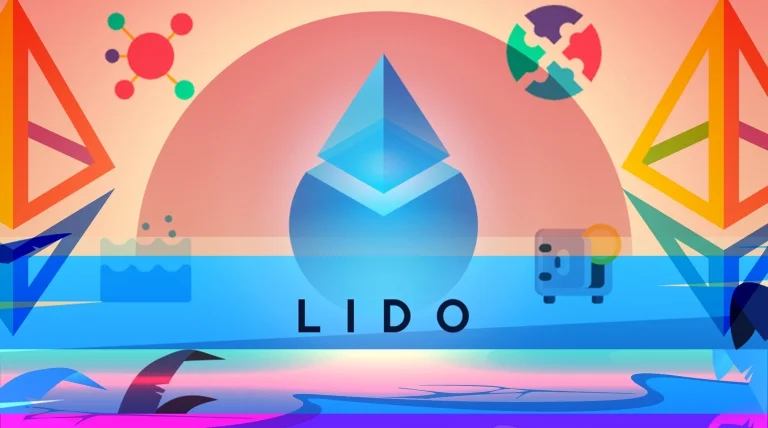
The Lido DAO (Decentralized Autonomous Organization) is responsible for the governance of the Lido liquidity staking protocol. Lido provides simplified staking solutions to the crypto community. The network is a popular option that currently hosts +$8,561,923,597 in staked assets. Today, Lido serves a vital role in helping new users get more involved in the decentralized economy.
How Does Lido DAO Work?
Lido DAO is a decentralized protocol that focuses on streamlining staking services for PoS networks. The protocol enables anyone to earn yield by delegating tokens to a trusted and preferred validator. The validator receives rewards for maintaining the network’s validity. These rewards are shared between the validator and their delegators based on their level of contribution.
The core aspect of Lido is the ability to use your staked assets to gain compounding yields. You can accomplish this task using the network’s many DeFi options. Staking on the network is an easy feature for new users to leverage. Staking is ideal because you know exactly what your returns will be and when they will be paid.
You can also use the network’s yield farming services, Yield farming is like staking except the APY varies. Farming pools have no lockup periods which has helped them gain popularity. Another great feature is the P2P lending options. DeFi lending is a popular option that enables you to secure interest on loans.
What Problems Does Lido DAO Attempt to Fix?
The Lido DAO serves multiple roles. The project was designed to help prevent any future governance issues related to Lido. DAOs replace personnel with smart contracts. These systems enable the community to put forth proposals to a vote. The proposals that get approved get implemented moving forward.

DAOs are more popular than ever in the DeFi market because they help to keep communities together. They provide more transparency and help prevent centralization. They also give users more control over token value. For example, it’s common for DAOs to vote to conduct token burns or buybacks to create more value.
Financial Barriers
Another major issue that Lido DAO helps to resolve is financial barriers to crypto adoption. There are lots of people who want to stake the new Ethereum 2.0 chain. However, you need to stake 32 ETH to qualify for staking privileges. For most people, this is too much.
The Lido project recognized this fact. It was launched only weeks after the Ethereum 2.0 Beacon Chain went live. The protocol provides a viable alternative that enables you to secure returns staking your favorite PoS blockchains. There are no minimum staking amounts on Lido which is a huge draw for many users.
Technical Expertise
Lido eliminates the technical requirements for staking. It streamlines the process so that anyone can enjoy the benefits. You can earn staking rewards without maintaining any form of staking infrastructure. This approach saves you money and time.
Locked Funds
One of the main issues that LIDO solves is locked funds. On most staking protocols, you must lock your funds into a network smart contract for a predetermined time. At the end of the staking period, you receive rewards. The problem with this approach is that you can’t access your funds during the staking period without losing your rewards.
LIido enables users to stake their crypto without a lockup period in a non-custodial manner. Users can use assets they have staked to leverage other ROI opportunities including P2P lending and yield farming opportunities. In this way, Lido seeks to revolutionize the staking sector.
Benefits of Lido DAO
The Lido DAO brings a lot of benefits to the table. For one, it gives this community a voice. DAOs have proven to be effective in helping a project remain decentralized. Additionally, the protocol is secure. It’s open-source and has been audited by third-party groups. These advantages enable the platform to provide trustless liquid staking services to the market.
Flexibility
Another major advantage of Lido DAO is its flexibility. Lido launched only servicing Ethereum. However, the protocol now offers services for Ethereum 2.0, Terra, Solana, Polygon, and Kusama. This flexibility has helped drive LDO token value up as there is more usability.
Passive Income
Passive income is the key to financial freedom. There are multiple ways that LDO token holders can secure passive returns. They can stake, farm, lend, and participate in governance tasks to secure rewards. The network also has a great referral program that enables you to earn LDO for sharing Lido.
Token
At the core of the Lido network is the LDO utility and governance token. This token is a versatile digital asset that can help you to express your ideas to the community and secure returns. This ERC-20 compatible token enjoys full interoperability within the Ethereum ecosystem.
LDO hodlers earn daily returns when they stake their token on the network. LDO has a capped supply of 1,000,000,000 tokens over the span of the project. There are currently 363,602,996 LDO in circulation.
Governance
The Lido DAO uses a weighted voting system to help determine the developments of the project in the future. This system gives large token holders more weight in their voting power. This structure is common in the DeFi sector. It has proven effective as those with the most invested have the most to lose.
Bottom Line
The Lido DAO is positioned perfectly to serve a crucial role in the growing PoS community. DAOs are now a standard feature in most networks in the DeFi sector. These groups continue to see their voting powers increase as more networks enter under DAO controls. Projects like the Lido DAO demonstrate the power of decentralization and community governance when integrated with DeFi ROI services.


















